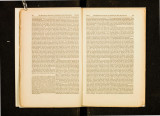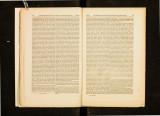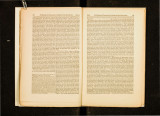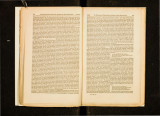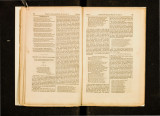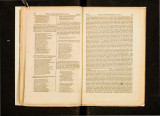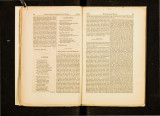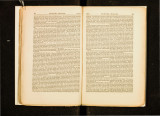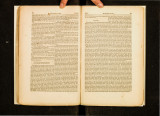| OCR Text |
Show 45!J The l!fassacltusetls Proposilion;or Aholis!ting the Slave Representation. [AuGUST, the Slave-holdine» States would never have ratified by that of freemen or of slaves"-" five hundred the ConstilUtion."' freemen, producing no more profils, no g reater sur- It may be true, that properly is the most eqni- plus fur the payment of taxes, than fi,·c hundred t:tble rule of taxation, but it is so difficult to dis- sla,•cs;• why should not the Soutl1eru States have cover the actual amoutl t of property held by each been allowed repre sC'n tation fur alJ their sla ves~ i ndividua l. that the practical application of the rule Slaves arc employed almost entirely iu agricul111re 1 is attended with a great many diflicultics. Popu- and the people of l\lassaehusetts can hardly believe lation affords a tolerably correct index of national that three white laborers engaged upon a l\lassa.wealth, the products of industry being measured chusetts farm can or do produce agricultural progenerally hy the number of inhabitants. 'l'he pro- ducts, equal in exchangeable value, with the amount ductions of some of the States were raised by free of agricultural products made by the labor of fh·e labor; the productions of others by slave ];lbor. sla\'es employed in the culture of cotton. hemp or The several States were bound to furnish to the tobacco. Look to the exports of the United States common t reasury an amount to be ascertained by fur the last fifty years, and sec how large a prot he number of people in each State. Of what im- portion was the pnlduct of the Southern slave labor. portance is it whP.ther the sum required, be made The imports have been paid for by the exports of by the labor of freemen or negro slaves~ Each the country.• State was at liberty to form its own domestic and h has heen contended that sla\'es are property, internal regulations, without tbe control or inter- and tberefore entitled to represe ntation not more ference of the co-States. According to the usages than any other ];ind of property . lf the Nonhem pre\·alent among independent and s<wereign States, people consirl er them only in the light of property, no state had a right to ask its co-States, from \\hat and not as persons, why do I hey manifest so much s pecies of labor they were enabled to pay their concern anJ sympathy~ Their zeal in fa\·or ofabproportion of the publ ic burdens. The States se\'- olition shows th:ll they recognize slaves as people erally posst>ssed the right to demand, that each also, and why not then allow them to be represhould cont ribute in proportion to population, but sented as people! If the Southern Slates had not fu rther they had no right to go. slave laborers, they would ha,·e an equal, if not a. The views of John Adams as expressed in the larger number of free laborers, all of whom, acCongress of Confederation are so just, that t l1ey cording to the Constitution, would be entitled to deserve anent ion on account of their bear ing upon representation in the House of Heprese ntatives. this subject. He remar ked," that the numbers of In the Shlve-holding States, the slaves cul tivate people are taken as an index of the wealth of the the soil and render services similar to those reoState, and not as subjects of taxation; that, as to dered by the free white laborers in other States. this matter, it was of no consequence by what name "A sl;we may indeed, (said l\lr. John Adams,) you called your people, whether by that of freemen from the custom of speech, be more properly called or of s!a,·es; that in some countries the laboriug the wealth of his employer; but as to the Stale, poor are called freemen, in others they arc called both arc equally its wealth, :1.11d should therefore slaves; but that the difference as to the State was equally add to tl1e quota of its tax." And why then imagi nary only. • • • Certai nly five hundred should they not add equally to the quota of its repfreemen produce no more profits, no greater sur- resentation 1 plus fo r the payment of taxes, than fi\•e hundred slaves: • • • Suppose, by an extraordinary ... Tn 1837, the exports of colton, tobacco an<l rice frolll operatton of nature or law, one half the laborers of the U.s. anJOunted in value to $71,345,028; and therea State could, in the courSP. of one night, be trans- maiudcr of domestic exporlS to $2--l,:.WJ,JSG. The exf)Orts formed into slaves, wou]J the State be made the of colton, tobacco nnd rice in 1838, amounted to $70.670,61!) poorer or Jess able to pay taxes 1 That the C(Jndi- in value; and ull o1hcr artici<·S of domestic export to tion of the labo ring poor in most countries, that tJf ~~~·:~:;:·l:j 1.1; n!~~~~~~h~f e;~~;:~:. :~~~~~~~:·c~~~~~:c:f ~~~ the fisherman particu la rly of the Northern Stale!', domestic eJJmrts 30 millions. The exports of cotton to· is as ahject as that of slaves. It is the number of !Jacco and rice in 1810 we1e 71 1-2 mil!ron-1 of clullars; :~nd laborers which produces the su rplus for taxation, the other articles of domestic export :19 mi!lious. In 1811, :J.Ud numbers indiscrimin:tlcly, therefore, arc the fair L!re exports of cotton.' lobacco and ri~e were nearly 69mil-index ~f wealth.'' When these. observations \\·~re :;~~:.; 1~~;:c L~:l:e;~~~~~d;~u:~~~~:;::~: ~~~~rrti:c3;0~-~h1;1 ~ made, tt had not then been dectded that ta xatton monthilcomm~ncin~t Jst O(·tohcr, 1812 aud endr ng30th June, should be reeuhted by the same ratio as representa- 1&13, 1•ere $55,396,611; und the other art1cles of domcstion, but thiscircumstance does not weaken the force t ic CXJtOrt were of the value of $22,397, 173. (See Reof his argument in favor of allowing representation JKirts ?f ~he Sccrct;uy o! t~e Treasury on tire Cornme~cc fur all the slaves instead of three-fifths of their nnd Nav1gftt1on of the V. :::i.) Cotton, tobacco and r1ce number. Popnlation bein~ ' ' t;~.ken as an index of :~~e P~::;c:~~~·.:·re;h:;· ~;;e~:~~~~~~~ee1~~n~~ :~rp::::::t the wealth of the State," tt beltlg "of no conse- gi\'e an impulse to the civili7.ation and improvement of que ncc by what name you cal led your people, whet her mankind. 1845.] 1'Ae Massaclmsells P roposiliolljur Abolislu'ng the Slave Representation. 453 I n the Report made to the Legislature of l\lassa- both, the South is entit led to representation for chusetl~ by John Adams' grandson, Charles F. them. Adam~, it is alleged, that as representation of three \Ve re fer to the 5 1th number of the Federalist, fifths of the slaves was conceded by the Fetlcral in which this ptO\'ision of the cnnstitution is disConvention, in consideration of the Slave-holding cussed. The writer denies "the fo.~ct, that slaves States paying direct taxes in the same ratio, and as are considered merely as property, and in no resthe government has rarely resorted to direct t:~.xa- pect whate,·er as persons. The t rue state of the lion, the Southern States ought not to possess the <:ase is, that they partake of both these <JUalities; right of s]a\'e representation without the burden of being considered by our laws, in some respec ts. as direct taxation; that while the latter has been occa- persons, and in other respects as property., T he sional only, the former has been enduring. Do not writer thus continues; " 1t is agreed on all sides, the Southern States consume imported artic les in that numbers, (mean ing g- ross numbers, the bond proportion to their gross population1 \Vcareconfi- and free,) are the best scale of wealth and t<'lxadent that such is the case, and if so, do they not tion, as they are the only proper scale of represenpay more revenue by indirect than tliey would be tation. \Vould the Convention ha"e bef'n impartial required to pay by direct taxation 1 Solllhcrn men or consistent, if they had rejccteJ the slaves from ha\'e advocated direct taxation in lieu of the tariff the list of inhabitants, when the shares of represystf'm, as a means of avoiding cxcessi~·e and une- sentation were to be calcul:lted ; and inserted them qual burdens, but we believe they have rarely, if on the lists, when the tariff of contributions was to ever, been cheered by the voice, or sustaineJ by be adjusted 1 Could it be reasonably expected, that the votes of Nortliern politicians. \Ve venture to the Southern States would concu r in a system, assert, that the Korthern people will never propose which considered their slaves in some degree as bona fide, that the Federal GO\•ernmeut should men, when burdens were to be imposed, bu t r~ almndon the indirect system of the taritr, for any fused to consider them in the same light, when lldplan of direct taxation, which the wit of man can vanta~es were to be conferred 1" I n the sequel of possiUiy devise. The North ha& too large a fund the same essay, it is said; "After all, may not of sagacity to originate or support any scheme of another ground be taken on which this article of the kind. The omission of the Federal Govern- the constitution will admit of a stilJ more ready dement to resort constantly to direct taxes, is in per- feuce 1 \Ve have llithcrto proceeded on the idea, feet harmony with the wi shes of the .Massachusetts that represe ntation related to persons only, and not Con,•ention which ratified the constitution. So at all to property. Dot is it a just idea J Governa" erse were the members of that Convention to mcut is instituted no less for protection of t11e prothe imposition of direct taxes by Congress, that they perly, than of the persons of indiv iduals. The submitted a proposition to amend the Constitution, one, as well as the other, therefo re may be conand prohibit Congress from laying direct taxes until sidered as represented by those who are charged "the moneys arising from the impost and excises with the Government. In the l"ederal Constitution, are insufficient for the public exigencies." The the rights of property a re committed into the same J'edera l Government has pursued the pol icy recom- hands , with the personal rights. Some attention mended by .l\1 assachusetts, and her citizens, while ought. therefore, to be paid to Jlroperty, in the choice opposed now to auy change of the system of taxa- of those hands." tion, are complaining as though the Constitution No man knew more thoroughly the reasons which was rcsponsiUic, instead of the l"edcral Govern- induced the Convention to adopt the various proment. visions of the Constilution.than A lcxander IIam il- J udge Story thinks the Slave-holding States ton. Let us see what lie ~aid on the subject of this enjoy a great advantage in the exemption of two {(!(/era! number in the Con \'Cntion held in the State fifths of the slaves from federal taxation. If none of New York, to decide the question of ratifying or of the slaves were counted in ascertaining the num- rejecting the Federal Constitution. her of representatives to which the Sll~vc - ho!ding "The first thing objected to, (s<~id he.) is that States a re entitled, these States would have fewer clause wl.ieh allows a representation for th reerepresentatives, and, as a necessary consequcnrc, fif!hs of the negroes. Much has been said of the would contribute Jess in the way of di1·ect taxation. impropriety of representing men, who have no The representation of the Sla\'e.holJing States will of their own. Whether this be reasoning or would he decreased, and thei r direct taxes dec reased declamation, l will not presume to say. h is the in the same proportio n. Such would be the result, unfortunate situation of the Southern States to ha \'e so long as laxation is propnr tioncd to rep rcsenta.- a great part of their population, as well as prolinn, as required by the Constitu:.ion. That instru- perty, in blacks. T he regulations complai ned of, ment pro1·ides the same rule for representation, as was one result of the spirit of accommodation whic h. for cont ribution-it recognizes sla\'eS as pcrsnns as go1•er ned the Conventio n ; and withou t this indul we\ 1 as property-and whether considered as per- ,renee no union could possibly have been formed. sons or prope rty, or partaking of the c ha racter of But, sir, co nsidering some pe<·uliar advantages |







